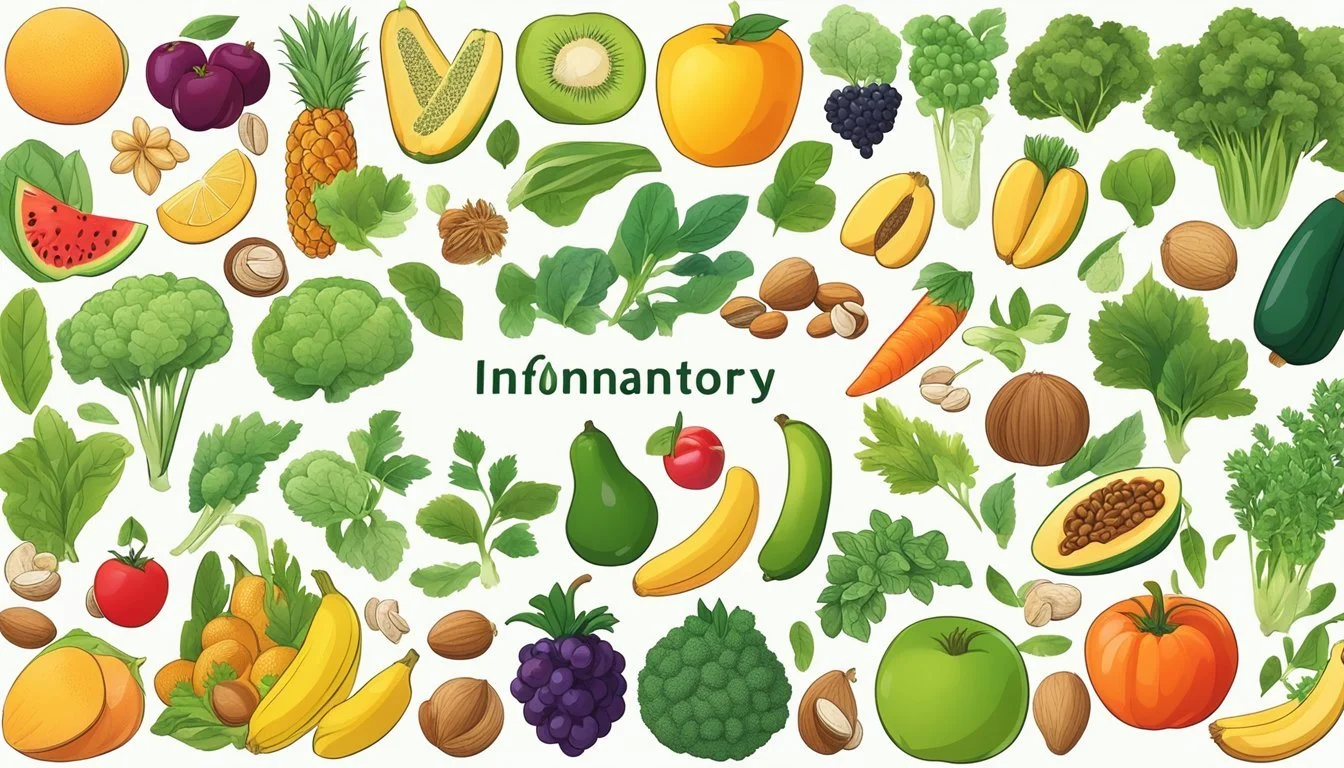Most Anti-Inflammatory Foods List
Your Guide to Healthier Eating Choices
Inflammation is an immune response by the body, a natural part of healing. However, chronic inflammation can contribute to a variety of health issues, such as heart disease, arthritis, and certain cancers. Diet plays a significant role in managing inflammation levels. Research indicates that consuming certain foods can help reduce chronic inflammation and improve overall health.
A variety of anti-inflammatory foods have been identified for their beneficial properties. Fruits like strawberries, blueberries, and oranges are rich in vitamins, fiber, and antioxidants that support the body's inflammatory response. Leafy greens such as spinach and kale, along with nuts like almonds (how long do almonds last?) and walnuts (how long do walnuts last?), provide essential nutrients that can also combat inflammation. Seafoods, especially fatty fish like salmon (What wine goes well with salmon?) and mackerel, have been shown to reduce inflammation.
Incorporating these foods into a balanced diet can help individuals manage or prevent inflammation-related health conditions. It's important to note that each person's response to foods can vary; personal triggers and sensitivities must be taken into account. A diet centered around whole, unprocessed foods, emphasizing plant-based selections, forms the basis of an eating plan.
Understanding Inflammation and Diet
The relationship between diet and inflammation is critical, especially considering the potential for dietary choices to influence the risk of chronic diseases. Understanding how certain foods impact inflammation levels in the body is crucial for maintaining health.
Inflammation can be acute or systemic, acute inflammation is the body's natural response to traumas, infection, and disease. When the body is constantly fending against inflammation it becomes known as systemic which can develop into chronic inflammation and chronic disease.
The Role of Diet in Chronic Inflammation
Chronic inflammation is an extended inflammatory response that the immune system orchestrates, which can lead to various health issues like metabolic syndrome and other chronic diseases. Dietary patterns play a significant role in modulating this response.
An anti-inflammatory diet aims to reduce this prolonged inflammation by focusing on foods that support immune system function without overactivating inflammatory pathways. Key elements of an anti-inflammatory diet include:
Whole grains: These are preferred over refined grains due to their lower inflammatory impact.
Lean proteins: Sources like poultry and fish are encouraged.
Omega-3: Found in fish such as salmon and sardines, omega-3s are pivotal in combating inflammation.
Fruits and vegetables: They are high in antioxidants and phytochemicals, substances that can lower inflammation.
Healthy fats: Olive oil is known for its anti-inflammatory properties.
It is generally recommended to avoid processed foods, excessive sugar, and trans fats as they can exacerbate inflammation.
Impact of Anti-Inflammatory Foods on Health
Incorporating non-inflammatory foods into one's diet is believed to offer multiple health benefits. The influence of these foods extends beyond just reducing symptoms of inflammation; they may also play a role in decreasing the likelihood of chronic disease development. Examples of foods include:
Tomatoes
Leafy greens: spinach, kale, and collards
Nuts: almonds and walnuts
Fatty fish: tuna, mackerel
Fruits: strawberries, blueberries, oranges
Regular consumption of such foods can assist in moderating the body's inflammatory processes, potentially aiding in preventing the onset of conditions related to chronic inflammation, such as metabolic syndrome.
Incorporating a variety of anti-inflammatory sources into one's diet is key to combatting inflammation. These foods are not only packed with nutrients that support overall health but also contain specific compounds known to reduce inflammatory processes in the body.
Sources of Omega-3 Fatty Acids
Omega-3 fatty acids are essential fats that the body cannot make by itself, playing a crucial role in reducing inflammation. Primary sources of omega-3s include:
Fish: Especially fatty fish like salmon and mackerel, which are high in EPA and DHA types of omega-3s
Flaxseeds (how long do flaxseeds last?): A plant-based source of ALA, another type of omega-3 fatty acid
Nuts: Particularly walnuts, which are a good plant source of omega-3s
Anti-Inflammatory Foods
Adopting a comprehensive dietary pattern proves to be an effective approach to reducing inflammation and staving off unhealthy weight gain. Such patterns emphasize a variety of anti-inflammatory foods that synergistically contribute to health.
Anti-Inflammatory Fruits
Apples: Rich in quercetin, apples may help to fight inflammation.
Oranges: With their high vitamin C content, oranges are known for their anti-inflammatory properties.
Strawberries: These berries contain antioxidants that are effective at reducing inflammation.
Cherries (how long do cherries last?): Both sweet and tart cherries are packed with anthocyanins, which can decrease inflammation, tart cherry juice shots are a great way to anti-oxidize.
Blueberries: These small fruits are high in antioxidants, specifically flavonoids, that may help in reducing inflammation.
Vegetables for an Anti-Inflammatory Diet
Broccoli (how long does broccoli last?): A cruciferous vegetable, broccoli is loaded with sulforaphane, an anti-inflammatory compound.
Tomatoes: Lycopene, found in tomatoes, is known for its anti-inflammatory effects.
Peppers: Both bell peppers and chili peppers possess benefits due to their high antioxidant content.
Healthy Grain Choices and Fiber
Whole grains: Foods like brown rice (how long does rice last?) and whole wheat contain fiber, which has been associated with lower inflammation levels.
Anti Inflammatory Diet Approaches
Some lean toward a whole-diet approach to maximize dietary inflammatory potential, which means tailoring your anti-inflammatory diet in one niche, two such examples are the Mediterranean diet and vegan and vegetarian diets revolving strictly around solely plant-based foods.
The Mediterranean Diet
The Mediterranean diet is considered a very healthy diet exemplified by its high consumption of olive oil, vegetables, fruits, and nuts.
This diet also incorporates substantial amounts of legumes, whole grains, and fish, providing a rich source of omega-3 known for their anti-inflammatory properties.
This balance makes it idyllic to use as a guideline for your anti-inflammatory diet, it has even been touted as the ultimate arthritis diet.
Vegan Diet
Plant-based anti-inflammatory diets focus on foods predominantly from plant sources and are often a go-to for anyone practicing vegan and vegetarian diets. This includes a variety of vegetables and fruits, nuts, seeds (how long do seeds last?), and whole grains, which are all rich in nutrients, fiber, and antioxidants.
These elements are integral in mitigating inflammation. Legumes serve as a staple protein source and are complemented by an array of herbs and spices to provide both flavor and anti-inflammatory benefits.
Key Elements of Plant-Based Dietary Strategies:
Fruits and Vegetables: A wide range, focusing on diversity and color.
Nuts and Seeds: Walnuts, almonds, flaxseeds, chia seeds (how long do chia seeds last?).
Whole Grains: Quinoa (how long does quinoa last?), brown rice, oats (how long do oats last?).
Nutrients that Reduce Inflammation in the Body
When addressing inflammation through diet, certain nutrients play pivotal roles. They help modulate the body's inflammatory processes and bolster the immune system.
Vitamins and minerals are crucial in managing inflammation. Antioxidants like vitamin C help protect cells from damage by neutralizing free radicals. Foods rich in vitamin C, such as berries and citrus fruits, are excellent choices.
Minerals like potassium and magnesium also aid in reducing inflammation. Potassium is vital for heart function and helps manage blood pressure, while magnesium has been linked to anti-inflammatory properties. Sources of these minerals include leafy greens, avocados, bananas, and whole grains.
Vitamin C: Citrus fruits, peppers, strawberries, broccoli
Potassium: Bananas, avocados, sweet potatoes, spinach
Magnesium: Pumpkin seeds (how long do pumpkin seeds last?), almonds, spinach, cashews
Proteins are essential components of healthy anti-inflammatory diets. Seeds, nuts, and beans are not only rich in protein but also contain anti-inflammatory compounds and essential fats.
Seeds: Chia seeds, flaxseeds, and hemp seeds (how long do hemp seeds last?) are full of fatty acids.
Nuts: Almonds and walnuts are great sources of protein and healthy fats that can help reduce inflammation.
Beans: Legumes like lentils (how long do lentils last?) and chickpeas offer both protein and fiber.
Incorporating a variety of these protein sources into one's diet can help tackle inflammation through multiple pathways.
Beverages with Anti-Inflammatory Properties
Beverages can play a crucial role in reducing inflammation, primarily due to the presence of compounds like polyphenols and antioxidants. Select teas and coffee are especially notable for their anti-inflammatory qualities.
Tea, particularly certain herbal and green teas, is rich in polyphenols, which are micronutrients lauded for lowering inflammation.
Green tea is distinguished in its health benefits due to a compound called epigallocatechin gallate (EGCG), which is known to reduce inflammation and aid in disease prevention. Herbal teas such as turmeric and ginger tea also contain potent anti-inflammatory properties.
Green Tea: Contains high levels of EGCG.
Herbal Teas (Turmeric, Ginger): Offer specific anti-inflammatory compounds found in the roots and spices.
Coffee contains a host of beneficial nutrients, including a significant amount of antioxidants. These antioxidants, such as chlorogenic acid, can help reduce the effects of inflammation but may cause high blood pressure.
While coffee may have a lower polyphenol content compared to tea, its widespread consumption means it can still contribute substantially to the average dietary intake of anti-inflammatory compounds.
Coffee: Offers chlorogenic acid, which has anti-inflammatory benefits.
polyphenols: Although lower than in tea, these are also present in coffee and contribute to its benefits.
Regular consumption of these beverages and avoidance of sugary beverages may support a reduction in systemic inflammation. However, they should be consumed as part of a balanced diet.
Managing Stress and Its Effects on Inflammation
Stress is a known trigger for inflammation. When an individual is stressed, their body responds by releasing stress hormones like cortisol, which in turn can promote inflammatory responses. You need to identify stressors and engage in stress-reduction techniques such as:
Mindfulness meditation: Practice mindfulness to lower stress levels and reduce inflammatory markers.
Regular exercise: Incorporate activities like yoga or walking, as physical activity can curtail stress hormones.
Understanding the Impact of Obesity
Obesity directly contributes to increased chronic inflammation and puts people at risk of cardiovascular disease and cancer. Excess body fat, particularly around the abdomen, secretes pro-inflammatory cytokines. Diet plays a crucial role in one's weight management:
Portion control: Be mindful of serving sizes to avoid overeating, which can contribute to obesity and inflammation.
Healthy fats: Incorporate sources of monounsaturated and omega-3 fats to lower inflammatory biomarkers.
Foods to Minimize in an Anti-Inflammatory Diet
When adopting an anti-inflammatory diet, it is crucial to limit foods that promote inflammation. Specifically, processed meats, foods high in saturated fats, added sugars and refined carbohydrates should be minimized, along with trans fats and fried foods (What wine goes well with fried foods?).
Processed meats, such as bacon, hot dogs, sausages, and bologna, contain high levels of saturated fats and should be consumed sparingly, choose to eat meat that is lean and high-protein instead.
Saturated fats are also found in foods like red meat and full-fat dairy products. These fats can trigger inflammation in the body when eaten in excess leading to high cholesterol and posing an increased risk of cardiovascular disease
Foods high in added sugars, such as candy, pastries, and sugar-sweetened beverages, are known to contain inflammatory proteins.
Likewise, refined carbohydrates found in white bread, pasta (how long does pasta last?) made with white flour, and other processed foods can have a similar effect on the body.
Trans fats, which are present in some margarines and commercially baked goods, contribute to inflammation and should be avoided and olive oil should be sought instead.
Fried foods worsen inflammation due to the unhealthy fats used in the frying process.
Avoiding the above list of foods that cause inflammation has many health benefits.
Understanding Food Labels and Marketing
When selecting foods for a healthy diet, consumers must navigate a maze of health claims and marketing tactics that can be both confusing and misleading. Decoding these messages is key to making informed choices that align with health goals.
The front of food packages often boasts a variety of health claims intended to catch the shopper's eye with terms like "low in saturated fat" or "contains monounsaturated fats." To understand these claims, one must look beyond the flashy fronts and examine the Nutrition Facts Label. Here, it is essential to distinguish between different types of fats:
Saturated Fat: Generally considered less healthy, it's advised to consume in moderation.
Trans Fat: Avoid these as they can be inflammatory and detrimental to health.
Unsaturated Fats (including Monounsaturated Fat): Usually better choices.
Processed foods often come with claims of being "trans-fat-free" yet may contain unhealthy levels of saturated fats or refined sugars, which are counterproductive for those seeking to reduce inflammation.
Food marketing often utilizes phrases like "made with real fruit" or "contains whole grains" to create a healthful image. It is critical to look past these claims and evaluate the ingredient list for clarity on what the product contains. Foods marketed as "natural" or "made with organic ingredients" do not automatically qualify as anti-inflammatory.
Here, the presence of certain fats can be an indicator of the product's potential impact on inflammation:
Saturated Fat: Low levels are preferable.
Trans Fat: Their presence should be a red flag to avoid the product.
Monounsaturated Fat: High amounts are often beneficial.
Checking the ingredient list for excessive sugar is also necessary. Even foods marketed as "anti-inflammatory" could contain ingredients that negate the potential health benefits.
Conclusion
Incorporating anti-inflammatory foods into one's diet may offer multiple health benefits, lowering inflammation in the body; particularly important for those managing chronic conditions. Individuals with heart disease could see improvements by eating foods rich in omega-3, such as salmon and mackerel. The anti-inflammatory properties of these foods support cardiovascular health.
For those with arthritis, including autoimmune forms like rheumatoid arthritis, consuming green leafy vegetables and nuts like almonds and walnuts may help reduce joint inflammation and pain. Similarly, fruits such as strawberries and blueberries are packed with antioxidants which can also assist in managing arthritic discomfort.
An anti-inflammatory diet may potentially lower the risks associated with cancer and Alzheimer’s disease, both of which involve inflammatory processes. While individual dietary needs can vary, it is commonly suggested that natural, whole foods with minimal processing provide the most health benefits.





